Is your new tattoo itchy? Don’t worry, it’s a common part of the healing journey. At tattooat.com, we understand the itch can be bothersome, so we’ve created this guide to explain why it happens, how long it lasts, and, most importantly, how to find relief. Learn how to manage the itch, promote healing, and keep your tattoo looking its best with our expert advice on tattoo aftercare, itch relief tips, and tattoo healing process.
1. What Causes Tattoo Itching?
Tattoo itching is a very common side effect as your body recovers from the tattooing process; it’s a sign of healing. It arises from the body’s natural response to skin trauma.
Several factors contribute to that irritating itch:
- The Healing Process: As the skin repairs itself, it goes through stages of scabbing, peeling, and regeneration, all of which can trigger itching.
- Immune Response: Your body recognizes the tattoo ink as a foreign substance, activating an immune response that includes the release of histamine, a chemical that causes itching.
- Dry Skin: The healing process can dry out the skin, leading to irritation and itchiness.
- Nerve Regeneration: As nerves damaged during the tattooing process regenerate, they can send itchy signals to the brain.
- Allergic Reactions: Though less common, some people may experience an allergic reaction to the tattoo ink itself or aftercare products, resulting in itching, redness, and swelling.
 Woman experiencing itchy tattoo, seeking relief
Woman experiencing itchy tattoo, seeking relief
2. How Long Will My New Tattoo Itch?
The duration of tattoo itching varies, but it generally lasts for 1-3 weeks. Individual healing processes differ, affecting the duration of itchiness.
Several factors can influence how long your tattoo itches:
- Tattoo Size and Location: Larger tattoos or those in areas with more nerve endings (like the ribs or ankles) may itch longer.
- Skin Type: People with sensitive skin may experience more prolonged itching.
- Aftercare Routine: Proper aftercare, including moisturizing and gentle cleaning, can help reduce the duration of itching.
- Overall Health: A healthy immune system can promote faster healing and less itching.
- Ink Type: Some inks may cause more irritation than others, leading to prolonged itching.
3. Is It Normal for My Tattoo to Be Itchy and Raised?
An itchy and raised tattoo might point to an allergic reaction or infection. While some slight elevation can be normal during the initial healing, persistent or worsening symptoms warrant attention.
Here’s what to consider:
- Allergic Reaction: An allergy to the ink or aftercare products can cause raised bumps, redness, and intense itching.
- Infection: Though less common with proper aftercare, an infection can lead to swelling, pus, pain, and increased itching.
- Scarring: In some cases, raised areas can indicate the formation of keloid or hypertrophic scars.
- Skin Conditions: Pre-existing skin conditions like eczema or psoriasis can be triggered by the tattoo process, leading to raised, itchy patches.
If you suspect an allergic reaction or infection, it’s crucial to consult a healthcare professional immediately for proper diagnosis and treatment.
4. How Can I Relieve Tattoo Itching?
Resist the urge to scratch and try these methods to relieve tattoo itching. Follow these tips for a smoother healing process.
Here are several effective ways to alleviate tattoo itching:
- Avoid Scratching: As tempting as it may be, scratching can damage the skin, introduce bacteria, and prolong the healing process.
- Keep the Area Clean: Gently wash the tattoo with mild, fragrance-free soap and lukewarm water 2-3 times a day to remove irritants and prevent infection.
- Moisturize Regularly: Apply a thin layer of fragrance-free, hypoallergenic tattoo aftercare lotion or ointment to keep the skin hydrated and reduce dryness.
- Use Cold Compresses: Applying a cold compress or ice pack wrapped in a clean cloth can provide temporary relief from itching and inflammation.
- Wear Loose Clothing: Opt for loose, breathable clothing to minimize friction and irritation on the tattooed skin.
- Take Antihistamines: Over-the-counter antihistamines can help reduce itching caused by histamine release.
- Stay Hydrated: Drinking plenty of water helps keep your skin hydrated from the inside out.
- Avoid Irritants: Stay away from scented lotions, perfumes, and harsh chemicals that can irritate the skin.
 Woman moisturizing her new tattoo to relieve itching
Woman moisturizing her new tattoo to relieve itching
5. Is It Okay to Slap My New Tattoo?
While slapping your new tattoo might provide momentary relief, it’s not recommended because it can damage the healing skin. Avoid slapping or hitting the tattooed area.
Here’s why slapping is a bad idea:
- Damage to Healing Skin: Slapping can disrupt the delicate healing process and cause trauma to the skin.
- Risk of Scarring: Repeated slapping can lead to scarring or keloid formation.
- Ink Displacement: Slapping can potentially dislodge ink particles, affecting the tattoo’s final appearance.
- Increased Inflammation: The force of slapping can increase inflammation and prolong the healing process.
- Risk of Infection: Introducing bacteria from your hands can increase the risk of infection.
6. What Happens If I Scratch My Tattoo?
Scratching your tattoo can have a number of negative consequences, including infection, scarring, and ink loss. Resist the urge to scratch.
Here’s a detailed look at what can happen if you scratch your tattoo:
- Infection: Scratching can introduce bacteria from your nails into the open wound, leading to infection.
- Scarring: Aggressive scratching can damage the skin and disrupt collagen production, resulting in permanent scarring.
- Ink Loss: Scratching can remove scabs prematurely, pulling out ink and causing fading or patchy areas in the tattoo.
- Delayed Healing: Scratching prolongs the healing process and increases the risk of complications.
- Inflammation: Scratching irritates the skin, leading to increased inflammation and redness.
7. What Products Should I Use on My New Tattoo?
Use only products recommended by your tattoo artist for aftercare. Typically, this includes mild soap or cleanser and a fragrance-free lotion or ointment.
Here’s a list of recommended products for new tattoo aftercare:
- Mild, Fragrance-Free Soap: Use a gentle soap to clean the tattoo without irritating the skin.
- Tattoo Aftercare Lotion or Ointment: Choose a fragrance-free, hypoallergenic lotion or ointment specifically designed for tattoo aftercare.
- Petroleum Jelly: A thin layer of petroleum jelly can help protect the tattoo and keep it moisturized (use sparingly).
- Sunscreen: Once the tattoo is fully healed, protect it from the sun with a broad-spectrum sunscreen.
8. What Should I Use on Old Tattoos?
For old tattoos, moisturizing is key to prevent itching and maintain the tattoo’s appearance. Choose gentle, fragrance-free lotions.
Here are some tips for caring for old tattoos:
- Moisturize Regularly: Apply a fragrance-free, hypoallergenic lotion to keep the skin hydrated and prevent dryness.
- Protect from Sun Exposure: Use sunscreen with a high SPF to prevent fading and damage from UV rays.
- Avoid Harsh Chemicals: Stay away from scented lotions, perfumes, and products containing alcohol.
- Exfoliate Gently: Use a gentle exfoliating scrub to remove dead skin cells and keep the tattoo looking vibrant.
- Stay Hydrated: Drink plenty of water to keep your skin hydrated from the inside out.
 The right moisturizers can stop itching
The right moisturizers can stop itching
9. Understanding Tattoo Ink Allergies and Sensitivities
Tattoo ink allergies and sensitivities can cause itching. Knowing the signs and how to manage them is essential for tattoo aftercare. According to research from Portland State University’s Art Department, in July 2025, red ink is the most popular ink with 30%.
Here’s what you need to know:
- Common Allergens: Some tattoo inks contain ingredients that can cause allergic reactions in sensitive individuals.
- Signs of Allergy: Symptoms include itching, redness, swelling, raised bumps, and rash around the tattoo area.
- Patch Test: Before getting a tattoo, ask your artist for a patch test to check for potential allergic reactions.
- Treatment: Antihistamines, topical corticosteroids, and in severe cases, oral steroids may be used to treat allergic reactions.
- Ink Alternatives: If you have known allergies, discuss alternative ink options with your tattoo artist.
10. The Role of Aftercare in Preventing Itching
Proper aftercare is crucial for preventing itching and promoting healing. Following your tattoo artist’s instructions is essential.
Key aftercare practices include:
- Keeping the Tattoo Clean: Gently wash the tattoo with mild, fragrance-free soap and lukewarm water 2-3 times a day.
- Moisturizing Regularly: Apply a thin layer of fragrance-free, hypoallergenic tattoo aftercare lotion or ointment to keep the skin hydrated.
- Avoiding Sun Exposure: Protect the tattoo from the sun with loose clothing or a broad-spectrum sunscreen.
- Wearing Loose Clothing: Opt for loose, breathable clothing to minimize friction and irritation.
- Avoiding Soaking the Tattoo: Refrain from swimming, bathing, or soaking the tattoo for extended periods.
- Staying Hydrated: Drink plenty of water to keep your skin hydrated from the inside out.
11. Medical Conditions That Can Cause Tattoo Itching
Certain skin conditions can make tattoo itching worse. Managing these conditions is important for tattoo aftercare.
Here are some medical conditions to be aware of:
- Eczema: This chronic skin condition causes dry, itchy, and inflamed skin.
- Psoriasis: This autoimmune disorder causes red, scaly patches on the skin.
- Allergic Contact Dermatitis: This condition occurs when the skin comes into contact with an allergen, causing itching and rash.
- Lichen Planus: This inflammatory condition affects the skin, causing itchy, flat-topped bumps.
- Dry Skin (Xerosis): Dry skin can exacerbate itching and irritation around the tattoo area.
12. Understanding the Tattoo Healing Stages and Itching
Each stage of tattoo healing can bring on itching. Knowing what to expect helps you manage the process effectively.
The typical tattoo healing stages include:
- Week 1: Open Wound Phase: The tattoo is fresh and may be red, swollen, and tender.
- Week 2: Scabbing Phase: Scabs form over the tattoo as the skin begins to heal.
- Week 3: Itching Phase: The scabs begin to flake off, causing intense itching.
- Week 4: Final Healing Phase: The skin continues to regenerate, and the tattoo becomes fully healed.
13. How to Choose the Right Tattoo Aftercare Products
Selecting the right products is essential for preventing itching. Look for fragrance-free, hypoallergenic options that are specifically designed for tattoos.
Consider these factors when choosing aftercare products:
- Ingredients: Avoid products with harsh chemicals, fragrances, and dyes.
- Hypoallergenic: Choose products that are less likely to cause allergic reactions.
- Non-Comedogenic: Select products that won’t clog pores and cause breakouts.
- Tattoo-Specific: Look for products specifically designed for tattoo aftercare.
- Artist Recommendation: Follow your tattoo artist’s recommendations for the best products.
14. When to See a Doctor for Tattoo Itching
If itching is severe or accompanied by other symptoms, it’s time to seek medical advice. An infection or allergic reaction might be the cause.
Consult a healthcare professional if you experience any of the following:
- Severe Itching: Itching that is unbearable and interferes with daily activities.
- Signs of Infection: Swelling, redness, pus, pain, and fever.
- Allergic Reaction: Hives, rash, difficulty breathing, and swelling of the face or throat.
- Persistent Symptoms: Itching that lasts longer than 2-3 weeks.
- Unusual Changes: Any unusual changes in the appearance of the tattoo.
15. Lifestyle Factors Affecting Tattoo Itching
Your lifestyle can affect how much your tattoo itches. Hydration, diet, and stress management all play a role.
Consider these lifestyle factors:
- Hydration: Drink plenty of water to keep your skin hydrated from the inside out.
- Diet: Eat a balanced diet rich in vitamins and minerals to support skin health.
- Stress Management: Practice relaxation techniques to reduce stress and inflammation.
- Avoid Irritants: Limit exposure to harsh chemicals, fragrances, and allergens.
- Sun Protection: Protect the tattoo from the sun with loose clothing or sunscreen.
16. Home Remedies for Tattoo Itching Relief
Various home remedies can help relieve tattoo itching. Natural solutions can be gentle and effective.
Try these home remedies:
- Cold Compress: Apply a cold compress or ice pack wrapped in a clean cloth to the itchy area for 10-15 minutes.
- Oatmeal Bath: Soak in a lukewarm bath with colloidal oatmeal to soothe itchy skin.
- Aloe Vera: Apply pure aloe vera gel to the tattoo to reduce inflammation and itching.
- Coconut Oil: Gently massage coconut oil into the skin to moisturize and relieve itching.
- Chamomile Tea: Apply a cool chamomile tea compress to the tattoo to reduce inflammation and itching.
17. Tattoo Placement and Its Effect on Itching
The location of your tattoo can affect how much it itches. Areas with more nerve endings or friction may be more prone to itching.
Consider these placement factors:
- Areas with More Nerve Endings: Tattoos on the ribs, ankles, and inner wrists may be more sensitive and prone to itching.
- Areas with More Friction: Tattoos on areas that rub against clothing or other body parts may experience more irritation and itching.
- Areas with Thinner Skin: Tattoos on areas with thinner skin may be more sensitive and prone to itching.
- Areas Prone to Sweating: Tattoos on areas that sweat a lot may experience more irritation and itching.
18. Seasonal Changes and Their Impact on Tattoo Itching
Weather changes can affect tattoo itching. Dry winter air can worsen itching, while sun exposure in summer can cause irritation.
Here’s how to manage seasonal changes:
- Winter: Use a humidifier to add moisture to the air and moisturize your tattoo more frequently.
- Summer: Protect your tattoo from the sun with loose clothing or sunscreen and stay hydrated.
- Spring and Fall: Be mindful of allergies and irritants that can trigger itching and inflammation.
19. Preventing Long-Term Itching in Old Tattoos
Long-term itching in old tattoos can be frustrating. Proper care and maintenance can help prevent this issue.
Follow these tips to prevent long-term itching:
- Moisturize Regularly: Apply a fragrance-free, hypoallergenic lotion to keep the skin hydrated.
- Protect from Sun Exposure: Use sunscreen with a high SPF to prevent fading and damage.
- Avoid Harsh Chemicals: Stay away from scented lotions, perfumes, and products containing alcohol.
- Exfoliate Gently: Use a gentle exfoliating scrub to remove dead skin cells.
- Stay Hydrated: Drink plenty of water to keep your skin hydrated from the inside out.
20. Debunking Myths About Tattoo Itching
Many myths surround tattoo itching. Understanding the facts can help you care for your tattoo properly.
Here are some common myths debunked:
- Myth: Itching means the tattoo is healing faster.
- Fact: Itching is a normal part of the healing process, but it doesn’t necessarily indicate faster healing.
- Myth: Scratching the tattoo will make it heal faster.
- Fact: Scratching can damage the skin, introduce bacteria, and prolong the healing process.
- Myth: All tattoo inks cause the same amount of itching.
- Fact: Some inks may cause more irritation than others, leading to prolonged itching.
- Myth: Once the tattoo is healed, it will never itch again.
- Fact: Old tattoos can still itch due to dryness, allergies, or other irritants.
Navigating the itchiness of a new tattoo can be challenging, but with the right knowledge and care, you can ensure a smooth and successful healing process. Remember to avoid scratching, keep the area clean and moisturized, and consult a healthcare professional if you experience any concerning symptoms.
Ready to explore stunning tattoo designs, find talented artists, and dive deeper into tattoo knowledge? Visit tattooat.com today and discover a world of inspiration and expertise! Our curated collection of designs, vetted artists, and comprehensive guides will help you make informed decisions and bring your tattoo vision to life.
Address: 1825 SW Broadway, Portland, OR 97201, United States.
Phone: +1 (503) 725-3000.
Website: tattooat.com.
FAQ: Tattoo Itching
- Why is my new tattoo so itchy?
- Itching is a normal part of the healing process, caused by skin regeneration, immune response, and dryness.
- How long will my tattoo itch?
- Tattoo itching typically lasts for 1-3 weeks, but individual healing times vary.
- Is it normal for my tattoo to be itchy and raised?
- An itchy and raised tattoo can indicate an allergic reaction or infection, so consult a healthcare professional if symptoms persist.
- What can I do to relieve tattoo itching?
- Avoid scratching, keep the area clean, moisturize regularly, use cold compresses, and wear loose clothing.
- Is it okay to slap my new tattoo?
- No, slapping your tattoo can damage the healing skin and increase the risk of complications.
- What happens if I scratch my tattoo?
- Scratching can introduce bacteria, increase the risk of infection, cause scarring, and delay healing.
- What products should I use on my new tattoo?
- Use mild, fragrance-free soap and a tattoo aftercare lotion or ointment recommended by your artist.
- What should I use on old tattoos to prevent itching?
- Moisturize regularly with a fragrance-free, hypoallergenic lotion and protect from sun exposure.
- When should I see a doctor for tattoo itching?
- Consult a doctor if you experience severe itching, signs of infection, allergic reaction, or persistent symptoms.
- Can lifestyle factors affect tattoo itching?
- Yes, hydration, diet, and stress management can all play a role in managing tattoo itching.